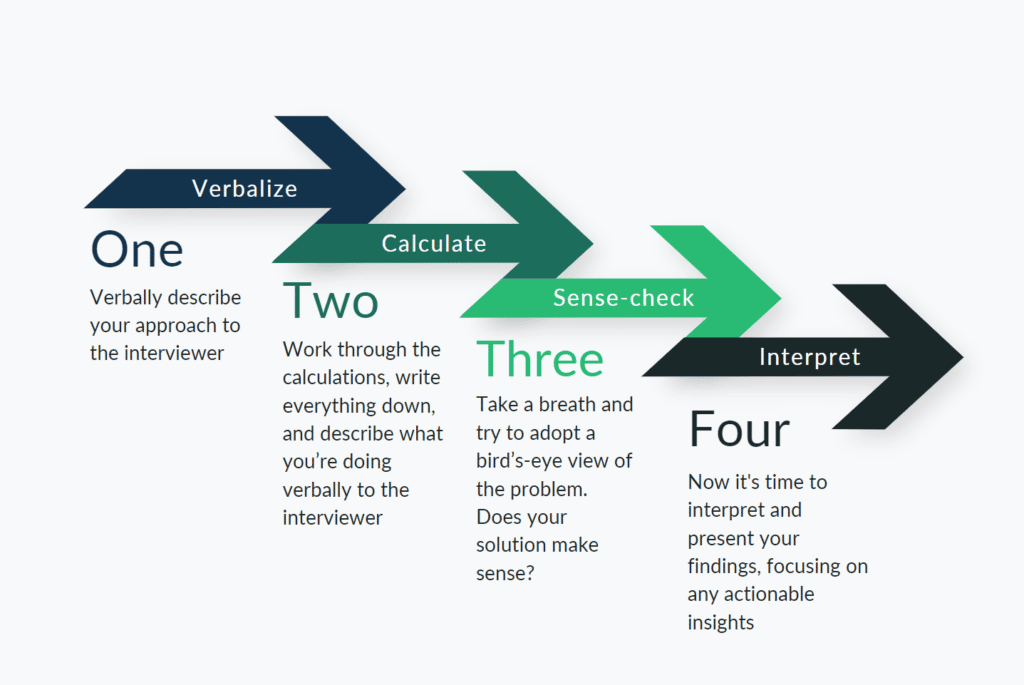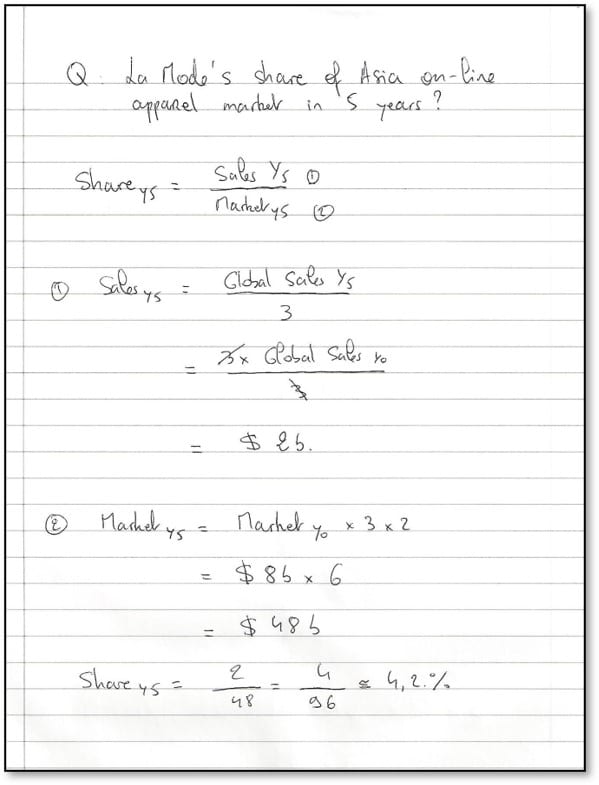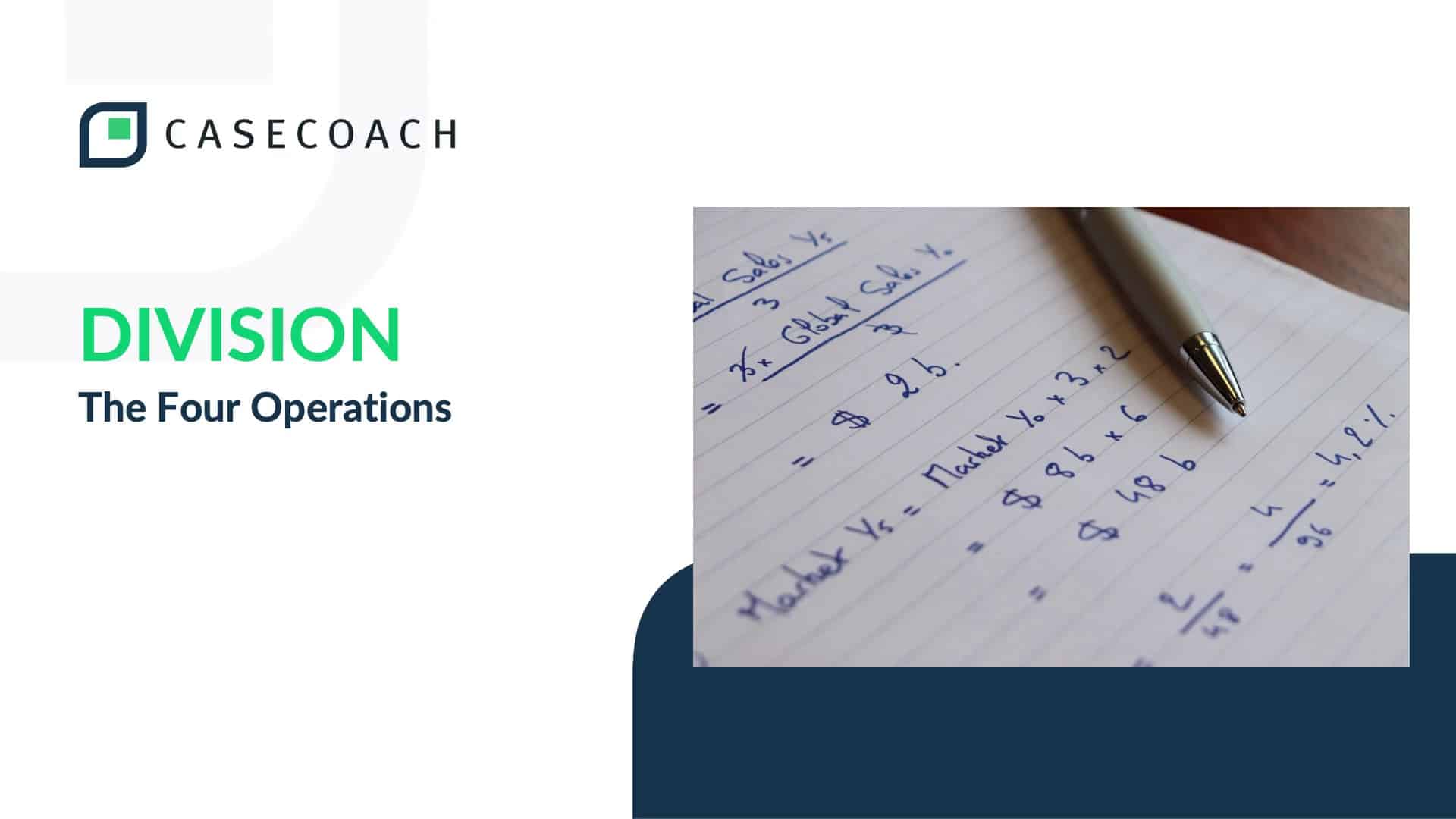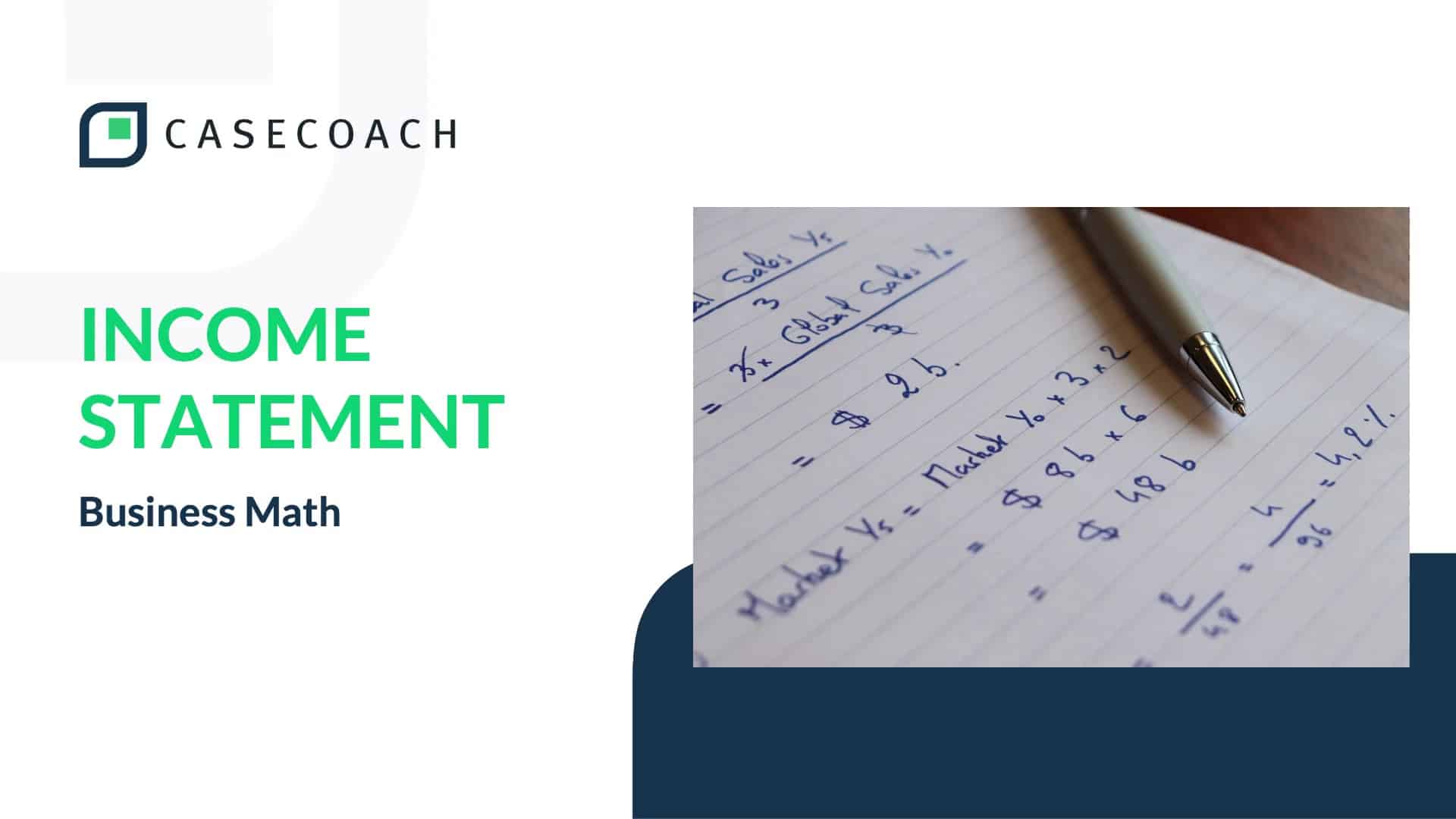When you relay your desire to break into management consulting, a typical quip that can often follow is: “How many golf balls fit in an airplane?”. While most management consulting firms have moved away from these types of questions, they still expect you to confidently and reliably navigate mathematical problems on the fly in case interviews.
Regardless of your degree or past experience, you’ll need to be able to perform calculations quickly and accurately, while demonstrating that you understand the overall structure of the problem and the implications of your solution.
The good news is that in case interviews, candidates are only required to demonstrate a high-school level of math skills. However, with no calculators allowed and an interviewer looking over their shoulder, many people find this aspect of the interview challenging.
This article will walk you through everything you need to know in order to ace case math, including the style of questions you can expect, the skills you’ll need to hone, and how you should prepare.
Key takeaways
- Consultants need to have strong mental arithmetic skills in order to perform key analyses and build credibility with clients.
- In case interviews, math problems can take the form of straight calculations, exhibits that require calculations, word problems, and estimation questions.
- To succeed in case math, we recommend following a four-step process of: ‘Verbalize, Calculate, Sense-check, Interpret’.
- It’s important to keep your work tidy and simple, and to communicate with your interviewer as you work through the problem.
- While you don’t need advanced knowledge to do well in case interview math, you do need to know the basic operations, key math concepts, and business math.
- To stand out to your interviewer, you need to work through math problems confidently and efficiently. Keeping track of zeros, simplifying your calculations, and memorizing frequently-used fractions will help you do this.
- It’s vital to prepare for case math. The Case Math Course – provided as part of our Consulting Interview Prep Toolkit – includes 21 video lectures that cover everything you need to know in detail.
- Once you’re comfortable with the theory, you can build your skills and confidence quickly with the calculation, case math and market sizing drills in our Consulting Interview Prep Toolkit. You can then practice live cases with other candidates in our Practice Room.
Why is math an important component of case interviews?
You might be wondering why, in an age where you can access a calculator or Microsoft Excel on your phone or laptop in seconds, interviewers still judge applicants on the strength of their mental arithmetic.
The rise of Excel and other mathematical modeling software has certainly saved consultants a lot of time and effort in recent years. However, when it comes to interacting with senior executives – where the perception of competence is paramount – mental math is unlikely to ever go out of style.
Consultants are often required to calculate values at a moment’s notice. Typical scenarios include being asked to:
- assess the impact of a proposed cost-saving measure
- estimate the revenue that a potential new product will generate
- using orders of magnitude to determine what a set of numbers could mean for the client and the problem at hand
How is consulting math tested in a case interview?
In this section, we’re going to address the types of math problems you’re likely to encounter in a case interview.
Straight calculations
It’s possible that an interviewer will give you a (relatively) straightforward math problem to solve as a standalone question.
Usually, however, these calculations take the form of follow-up questions in a larger case study.
In a product launch case, the interviewer might ask you to calculate the average price of a product for a company that sells:
- 10,000 units at $15 per unit through one channel, and
- 20,000 units at $12 per unit through another channel.
You’d need to quickly compute that the average price is (10,000 x $15 + 20,000 x $12) / (10,000 + 20,000) = $13.
Consulting charts and exhibits that require calculations
There are several types of calculations that your interviewer might propose or ask you to perform based on data in a chart or exhibit.
Here’s an example of an exhibit that you might be given in a market entry case:

In this example, your interviewer might ask you to identify which city offers the greatest potential market for customers aged 20 to 40.
You might then be asked to calculate the percentage difference between the largest and second-largest markets.
You could eliminate Hillwood and Bedrock immediately, simply by eyeballing the surface areas of the ‘20 to 30 years’ and ‘30 to 40 years’ segments and noticing that they are the smallest.
Then it would be worth computing the values for the remaining three cities, which are more difficult to differentiate visually.
You would do this by multiplying the share of their population in the 20-40 age range by their total population, as follows:
- King’s Landing: (26% + 18%) x 11.4 mn ≈ 5.0 mn
- Citadel: (60% + 11%) x 5.5 mn ≈ 3.9 mn
- Metropolis: (20% + 20%) x 13.5 mn ≈ 5.4 mn
Metropolis has the largest potential market, with 5.4 million customers aged 20 to 40. This is 8% larger than the potential market of King’s Landing (5.4 / 5.0 = 1.08).
Word problems
Word problems are another staple of case interviews. They’re likely to be fairly familiar, as you’ll almost certainly have encountered them at some point in your schooling.
In the context of a case interview, word problems usually require algebraic calculations. Candidates are expected to extract the most important facts and figures from the word problem, present them in the form of an equation, and then perform the calculations.
One common type of word problem that often crops up in case interviews is the ‘breakeven analysis’. This requires candidates to calculate the amount of sales that a company needs to make to recover its costs (i.e. to make neither a profit nor a loss).
Let’s say your client is a mid-sized Peruvian copper-mining firm that’s invested $50 million in land purchases, development costs, and equipment. They’ve approached your firm to find out how much copper they need to sell to recoup that investment.
In the current market, CopperCollect expects to gross about $10,000 per tonne of copper sold. It costs the firm about $3,000 per tonne to extract, ship, and store the copper.
In this scenario, you’d need to divide the firm’s total investment ($50 million) by the gross profit per tonne ($7,000) to find that the mining firm has to sell ~7,200 tonnes of copper to break even.
Estimation questions
The last type of quantitative question you’re likely to encounter in a case interview is the estimation question (also known as the ‘market sizing’ question).
In estimation questions, candidates are required to arrive at a value based on very little upfront data – or sometimes none at all. Here are some examples:
- How many petrol pumps are there in the UK?
- What is the annual revenue of a global sandwich chain?
- What is the size of the market for lattes in the US?
- How many newspapers are sold in Spain?
Estimation questions provide candidates with a good opportunity to demonstrate their ability to make common-sense assumptions and extrapolate a small amount of data using a structured approach. You can learn more about how to do this in our article on nailing market sizing case questions.
Our tips for succeeding case interview math
Follow a four-step process
As with many other aspects of case interviews, there’s a process you can use to structure your thoughts and analysis in case math:
1. Set your approach and describe it
Before you begin to solve the problem, tell your interviewer the approach you plan to take. This will both help you to structure your thoughts and allow your interviewer to correct any mistakes or incorrect assumptions you might have made.
If your interviewer agrees with your approach, they might indicate that they’re happy to ‘sign off’ on it, either verbally or non-verbally.
2. Calculate
The second step is to work through the required calculations correctly, confidently, and quickly. Be sure to write everything down and tell the interviewer what you’re doing, as this will help them to follow along.
3. Sense-check
After you’ve completed your calculations, pause for a moment to take a bird’s-eye view of your approach. Does your solution make sense?
If you’re trying to assess the yearly revenue of a well-established multinational law firm and your final result is just a few thousand dollars, common sense should tell you that you need to return to your calculations.
4. Interpret
Finally, you need to demonstrate to your interviewer that you can glean meaningful and – wherever possible – actionable insights from calculations. Ask yourself whether your solution supports your initial hypothesis.

Keep your work tidy and simple
Throughout this process, you should write everything down and ensure that your calculations are tidy and simple. Otherwise, you could easily become confused and you’ll be unlikely to impress your interviewer, who will be expecting you to take a professional approach to the exercise.
Here are some simple measures that can help you keep your case math work neat and organized:
- Use a fresh sheet of paper for every problem and non-trivial calculation
- Write neatly and give yourself ample space on the page
- Align your ‘equal signs’ on the page to keep your calculations tidy
- Compute one operation at a time
- Avoid multiplying percentages together, as this can often lead to errors
- Look out for when it might be wise to use a table to synthesize different units or types of data
Here’s an example of an effective page of case math calculations:

Work with your interviewer
While it might be tempting to stay silent and then impress your interviewer with the correct answer after performing your calculations, the most successful candidates involve their interviewer in the process.
This means you should:
- get upfront feedback on the approach you plan to take
- state your assumptions out loud
- ask the interviewer to provide additional information about certain data sets (although this won’t be appropriate for estimation questions)
- describe everything you’re doing as you perform your calculations
There are many benefits to working with your interviewer in this way. It allows you to react to their verbal or non-verbal feedback in real time. They may even point out errors that you’ll then have the opportunity to correct. It also demonstrates that you have the confidence to collaborate with others on these kinds of problems, and work well in a team.
You can see all of this in action in the following video, which shows a candidate working with their interviewer to solve a math problem in a case interview:

What kind of math do I need to know to ace my case interview?
To do well in case math, there’s no need for you to learn advanced math or complex corporate finance. Instead, you simply need to master the following types of calculations:
Basic operations
You learned the four basic operations at school, and they’re pivotal in case interview math.
To recap, the basic operations are:
- addition
- subtraction
- multiplication
- division
You might already feel confident that you’ve got the four operations down. However, it’s still an excellent idea to brush up on performing these kinds of calculations – especially with a pen and paper.
This video, taken from the Case Math Course, provided as a part of our Consulting Interview Prep Toolkit, walks you through everything you need to know about division for case interviews.

Key math concepts
Along with the four basic operations, you’ll also be required to employ many of the following key math concepts in your case math calculations:
- Fractions
- Percentages
- Compounding
- Weighted averages
- Probability
- Algebra
Business math
As consulting roles focus on improving business performance, it shouldn’t come as a surprise to learn that you’ll probably be tested on business math in a case interview. You’ll need to know how to:
- interpret financial statements (i.e. income statements, balance sheets, and cash flow reports)
- make an investment decision
- value a business
- optimize operations
This video, which is also from our Case Math Course, walks you through everything you need to know about income statements:

How to stand out in case interview math
The more proficiency and confidence you can demonstrate with math, the more you’ll impress your interviewer. Being able to work through these problems efficiently will also give you more time to work on other aspects of the case.
Here are three pro tips that can help you stand out from the crowd:
1) Keeping track of zeros
The number-one math mistake we see candidates make in case interviews is miscounting zeros. Case questions often involve large numbers, sometimes in the millions or even billions.
Because of this, it’s easy to misplace or inadvertently leave out a zero and render your entire calculation incorrect as a result. Keeping close track of your zeros is therefore crucial. We recommend using one of the following methods to do this:
- Counting the zeros in your calculation
- Using scientific notation
- Assigning letter units to zeros
2) Simplifying your calculations
Simplifying your calculations in case interview math will help you to work through the problem with greater speed and efficiency. It will also demonstrate a level of confidence to your interviewer and show that you’re more interested in the essence of the problem than in getting caught up in trivial details.
One way of simplifying calculations is by rounding numbers up or down to make them more ‘friendly’. There are typically two opportunities to do this in a case interview:
- When making assumptions about figures like population numbers
- When performing calculations, rounding numbers as you go
There are a few important points to note when it comes to rounding figures in case interviews. First, check that your interviewer is happy for you to do this. Then, as you progress through the problem, communicate any rounding assumptions you make. Finally, bear in mind that as a rule of thumb, effective rounding shouldn’t change the answer by more than 10%.
3) Memorizing frequently-used fractions
Some fraction values are used so frequently in case math that knowing them – along with their percentage value and decimal conversions – can save you significant time. We recommend memorizing the fraction and corresponding percentage and decimal values of 1/2, 1/3, all the way through to 1/10.
How to prepare for case interview math
While case interviews require candidates to demonstrate only a high-school level of math proficiency, you’ll likely need to refresh your skills in this area. Remember that you’ll be performing calculations with a pen and paper, with an interviewer looking over your shoulder.
The good news is that we’ve got everything you need to brush up on math theory and then put it to the test.
Understanding the theory
The dedicated Case Math Course, in our Consulting Interview Prep Toolkit, includes 21 video classes that cover the following areas in detail:
- The four operations: addition, subtraction, multiplication, and division
- All the key math concepts you’ll need to master, including fractions, percentages and weighted averages
- ‘Pro-tips’ for doing well in case math, including keeping track of zeros and simplifying calculations
- Business math concepts you’ll need to know, including cash flow, investments, and valuations
Putting the theory into practice
Once you’ve developed a firm grasp of the theory, you can put it into practice with the other resources in the Consulting Interview Prep Toolkit.
As mental arithmetic is one of the case interview skills you can practice alone as part of your preparation, we’ve included a comprehensive set of calculation drills in the Toolkit. Drills are interactive exercises that pose rapid-fire questions and then provide instant feedback.
When you feel confident with your calculation skills, you can move on to our case math drills and market sizing drills. These allow you to practice all the elements of case math, including requesting missing data, setting an approach to calculating the solution, making reasonable assumptions, and interpreting the results.
The final – and most important – stage of case math preparation is practicing live cases with a partner. Most candidates who go on to receive an offer from a top consulting firm like McKinsey, BCG or Bain complete at least 25 live practice sessions before their interview. At CaseCoach, we can connect you with a diverse community of fellow candidates who are all available for case interview practice in our Practice Room.







